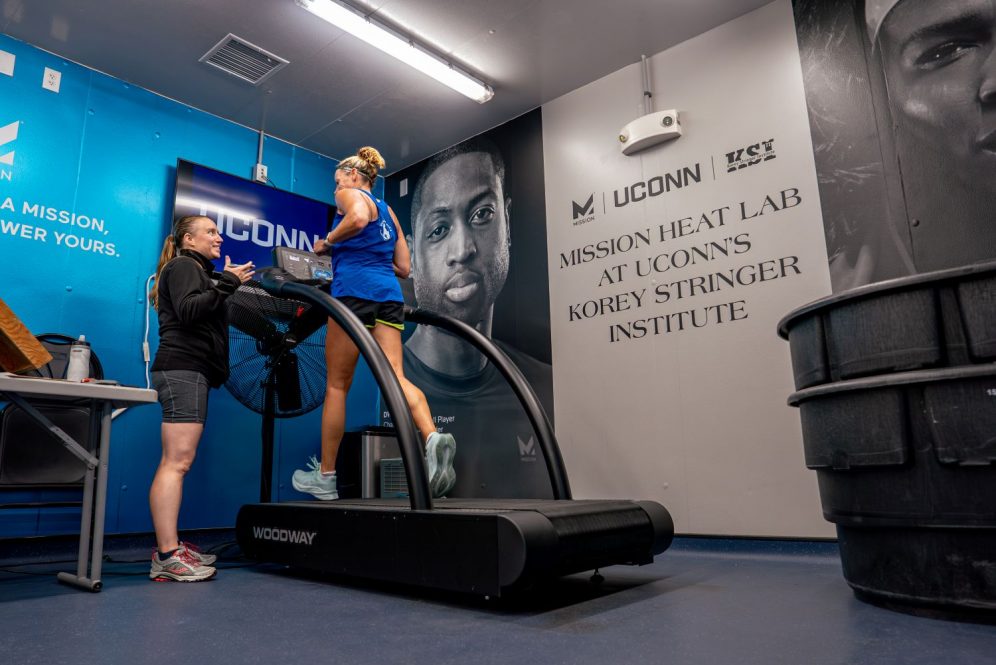Synthesizing data from 16 human field studies, a new tool from UConn's Korey Stringer Institute aims to help athletes and the general public stay hydrated and healthy

Rebecca Stearns of the Department of Kinesiology and Chief Operating Officer of the Korey Stringer Institute (KSI) works with Kara Kochanski-Vendola, girls track and field coach at Norwich Free Academy in Norwich, CT, on running tests in the MISSION Heat Lab in the Harry A. Gampel Pavilion (GAMP). Aug. 19, 2025. (Jason Sheldon/UConn Photo)
Researchers at the Korey Stringer Institute (KSI) in the College of Agriculture, Health and Natural Resources (CAHNR) have created an open-access document to help athletes, coaches, and parents understand the latest research on hydration's impact on athletic performance and recovery.
This work was published and is available for free in the Open Access Journal of Sports Medicine.
"This paper intended to take a lot of the scientific literature and put it into consumable format for any user, even if they don't have an expertise in health, so they can get a good idea of how to implement hydration monitoring and strategies," says Rebecca Stearns, associate professor-in-residence in the Department of Kinesiology, chief operating officer at KSI, and one of the authors on the paper. Lawrence Armstrong, professor emeritus, was the lead author.
Synthesizing data from 16 human field studies, the paper highlights known biomarkers related to hydration such as body mass changes, thirst rating, urine specific gravity (a measure of the ratio of water to particles of waste processed by the kidneys), and urine color.
"A lot of the hydration literature is very multifactorial and it's on a very individual level, which is why it becomes very complicated very quickly," Stearns says. "You have multiple indicators, and you have a lot of individual factors that go into what somebody truly needs, and this is trying to pull all that information together in, hopefully, a way that can be utilized by the end user."
The paper includes sections on hydration strategies to ensure athletes are properly hydrating during exercise and before games, which is particularly important in sports like soccer or field hockey where players don't have frequent water breaks.
Proper hydration ensures athletes are able to perform at the top of their game, and protect their health as dehydration can cause headaches, lightheadedness, and heat exhaustion.
The article includes specific data on individual sports including football, running, soccer, wrestling, and martial arts.
The paper also emphasizes the importance of not overhydrating. Overhydration can lead to a condition known as exertional hyponatremia which can cause nausea, vomiting, lightheadedness, headaches, and even collapse, seizure, or coma in extreme cases.
While the paper is focused on proper hydration as it relates to athletes specifically, many of the lessons are relevant for everyone.
"I hope that, while some of the information is sports-specific, a lot of the indicators to help track or assess hydration markers are things anyone can use," Stearns says.
This paper also highlights the work that still needs to be done in the field of hydration and athletic performance. For example, most studies have focused on endurance sports like soccer, but the science is beginning to show that hydration plays a key role in strength-based exercise as well.
Another critical gap in this field is that the vast majority of studies have been done in males. This not only underserves female athletes, but women laborers and warfighters, occupations that are especially susceptible to the dangers of dehydration and heat-related illnesses. In the studies represented in the review paper, there were 472 male participants compared to 169 female participants.
"We are making massive assumptions about females at this point in terms of fluid needs and fluid dynamics that may fluctuate much more in a female individual than a male," Stearns says. "That is an area that we are seeing expand right now and certainly an area that is going to matter in the future."
This work relates to CAHNR's Strategic Vision area focused on Enhancing Health and Well-Being Locally, Nationally, and Globally.
Follow UConn CAHNR on social media






